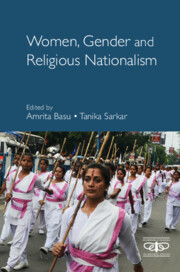Book contents
- Frontmatter
- Dedication
- Contents
- List of Abbreviations
- Introduction: Women of Hindu Rashtra
- Part I Changing Modalities of Hindu Nationalist Organizing
- Part II Gendered Techniques of Mobilization: The Sangh and the Samiti
- Part III Cultivating Women’s Militancy: The Vishva Hindu Parishad
- Part IV Refashioning Gender and Sexuality
- Part V Alternative Activist Responses to the Hindu Right
- Glossary
- About the Contributors
- Index
5 - Sanskaras, Sexuality and Street Activism: VHP Women at Work
Published online by Cambridge University Press: 12 August 2022
- Frontmatter
- Dedication
- Contents
- List of Abbreviations
- Introduction: Women of Hindu Rashtra
- Part I Changing Modalities of Hindu Nationalist Organizing
- Part II Gendered Techniques of Mobilization: The Sangh and the Samiti
- Part III Cultivating Women’s Militancy: The Vishva Hindu Parishad
- Part IV Refashioning Gender and Sexuality
- Part V Alternative Activist Responses to the Hindu Right
- Glossary
- About the Contributors
- Index
Summary
Introduction
The Vishva Hindu Parishad (VHP), a Hindu religio-nationalist organization, came into existence in 1964 with the ostensible goals of rekindling ‘Hinduness’ as well as Hindu nationalism – particularly among the Hindu diaspora and among tribal communities in remote parts of India. It is a wing of the Rashtriya Swayamsevak Sangh (RSS) led Sangh Parivar that works to disseminate the beliefs of Hindu nationhood in India and abroad. As part of this goal, the VHP has worked hard to pressurize the different central governments in India to construct a Ram temple at the erstwhile Babri Mosque site in Ayodhya – which, claims the Sangh Parivar, was the birthplace of the Hindu deity Ram. It is thus central to the identity of Hindus as a religious community. The VHP has also run campaigns for ghar wapsi, ‘love jihad’ and ‘cow protection’. Its women members, who are part of the main VHP organization and its offshoots, the Durga Vahini (Army of Durga) and the Mahila Vibhag (Women's Wing), play an important role in the project of Hindutva-ization. They have contributed not only in building the local visibility and media presence of the VHP but also in defining and fixing meanings of social values, morality and sexuality for a large segment of Hindus.
The aim of this chapter is to highlight how the women of the VHP carry forward the Sangh agenda, at a time when the Bharatiya Janata Party (BJP, also a part of the Sangh Parivar) strove to become – and, eventually, did become – the ruling party in India. The chapter is divided into two sections. The first section discusses the launch of two women's organizations by the VHP and their main aims. It also discusses how they function within the larger mould of Hindutva. The second section looks at their activities in contemporary times, from around 2010. It focuses on how the organizations have moved from a national Ram Janmabhoomi-centric activism to a more locally oriented street and service activism. This section also elaborates the meanings of family, sanskaras and sexuality that are disseminated by these women's wings and have fed into the larger discourse of Hindu nationhood.
- Type
- Chapter
- Information
- Women, Gender and Religious Nationalism , pp. 149 - 168Publisher: Cambridge University PressPrint publication year: 2022
- 1
- Cited by



